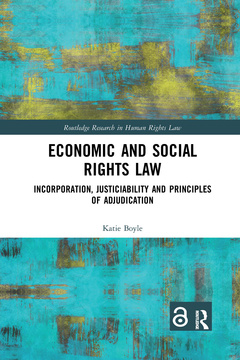Economic and Social Rights Law Incorporation, Justiciability and Principles of Adjudication Routledge Research in Human Rights Law Series
Auteur : Boyle Katie

This book develops principles of adjudication to facilitate accountability for violations of Economic and Social Rights.
Economic and Social Rights engage with areas relating to social justice and their violation tends to impact on the most vulnerable members of society. Taking the UK as a case study, the book draws on international experience and comparative practice, including progressive reform at the devolved subnational level, that demonstrate the potential reach of Economic and Social Rights when the rights are given legal standing in domestic settings according to their status in international law. The work looks at different models of incorporation of rights into domestic law and sets out existing justiciability mechanisms for their enforcement as well as future models open to development. In so doing the book develops principles of adjudication drawn from deliberative democracy theory that help address some of the critiques of social rights adjudication.
This book will have a global and cross-sectoral appeal to legal practitioners, the judiciary and the civil services, as well as to researchers, academics and students in the fields of human rights law, comparative constitutional law and deliberative democracy theory.
Chapter One: Principles of ESR adjudication
Chapter Two: ESR in international law: justiciability and remedies
Chapter Three: The jurisdictional hierarchy as pillars of the UK constitution: the regional framework
Chapter Four: The Constitutional Resistance to Human Rights: The UK in a comparative context
Chapter Five: Models of ESR justiciability: existing mechanisms and future options
Chapter Six: ESR and Devolution
Katie Boyle is Associate Professor in International Human Rights Law at the School of Law, University of Stirling. She has published widely on the justiciability of economic, social and cultural rights and human rights reform during periods of constitutional transition. She was a member of the First Minister’s Advisory Group on Human Rights Leadership (Scotland) and previously qualified as a lawyer with the Government Legal Service for Scotland.
Date de parution : 06-2022
15.6x23.4 cm
Date de parution : 06-2020
15.6x23.4 cm
Thèmes d’Economic and Social Rights Law :
Mots-clés :
UK Constitution; ESR; UK Bill; Socio-Economic Rights; UK Discourse; Economic Rights; UK Parliament; Social Rights; UK Supreme Court; Social and Cultural Rights; UK’s Membership; Domestic Protection; UK Court; Jurisdictional Hierarchy; EU Charter; Deliberative Democracy Theory; Cultural Rights; Human Rights; UK Law; Universal Indivisibility; Domestic UK Law; Bifurcation Axis; Public Interest Litigation; European Union; EU Law; Brexit; International Complaints Mechanism; Peace Agreement; UK’s Commitment; Lex Pacificatoria; UK Judge; International Law; UK’s Exit; Equality; EU Legal Order; social rights law; Public Sector Equality Duty; justiciability mechanisms; UK Judiciary; UK Level; UK Jurisdiction; UK Government; UK Signal; Minimum Core



